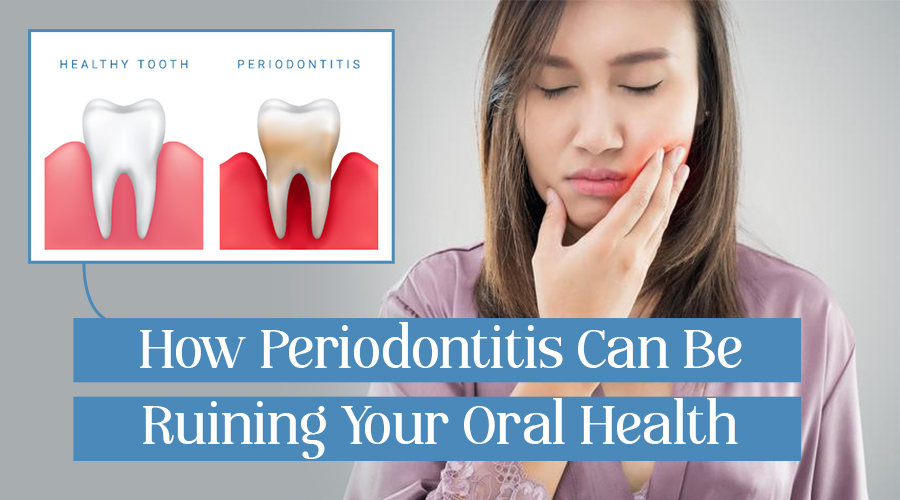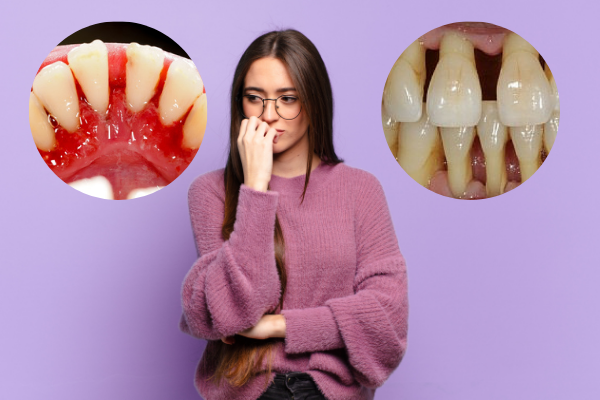Do you skip your dental hygiene routine frequently? You might think, “It can’t really hurt too much.”
It’s pretty easy to have this mindset, as oral health doesn’t get worse from one day to the next. But you can bet it will get worse, and that’s when most people regret not taking care of their teeth with something as simple as brushing.
What are we exactly talking about?
Periodontitis.
It is often known as gum disease and is a dangerous gum infection that affects your soft tissue and can completely ruin the bone that supports your teeth. If you don’t treat it on time, periodontitis can cost you one or many teeth.
Periodontitis is a frequent condition that you can definitely avoid in most cases because poor oral hygiene is frequently the cause.
Brushing your teeth twice a day, at least flossing daily, and seeing your dentist at least twice a year can considerably enhance your odds of successfully treating periodontitis and lowering your risk of acquiring it in the first place.
This article collected essential details about this disease to help you stay informed and learn more about the causes, symptoms, and treatment to stop periodontitis from ending your dental health.
Remember your adult teeth will be with you forever, and learning to protect them from these threatening diseases can save you a lot of time, pain, and money. Keep on reading to find out more about gum disease.
Watch Out of Symptoms of Periodontal Disease
Gum disease is a silent enemy of your mouth. In fact, you could be dealing with it right now without even knowing it.
Because early symptoms are easy to be overlooked, less than 60% of adults with gum disease are aware that they have it.
They usually realize it when the disease has progressed to an advanced stage because they feel more evident changes in some parts of their mouth. This represents a problem, as it makes people wait longer to get treatment and worsens the damage.
However, there are some troubling signs and symptoms you should look out for. They can vary depending on the disease’s stage but commonly are:
- Bad breath or a persistent bad taste.
- You start to notice bleeding when brushing or flossing your teeth.
- Red, swollen gums
- Tenderness in your gums
- Pain when eating
- Loose teeth
- Sensitivity to hot and cold
- Your gums look like they’re pulling away from your teeth.
- Tartar buildup
When you start noticing loose teeth, there’s a chance they could fall out, and tooth loss is the worst and most frequent consequence of periodontitis.
As you may imagine, it’s more than necessary to get dental checkups regularly since your dentist is the one who can identify those silent early stages.
What Causes Periodontal Disease In Your Mouth?
By now, it’s pretty clear that the leading cause of periodontitis is poor oral hygiene. Bacteria forms and builds upon your teeth if you don’t brush them correctly every day. Which only leads to a damaging process that ends up in gum disease.
Some other important causes can be:
- Smoking: weakens the body’s natural defenses against illness (your immune system). It makes fighting a gum infection more difficult. Also, treatments for gum disease may not be as effective for smokers. Your chances of developing this condition increase when you use tobacco in any form. This includes cigarettes, pipes, and smokeless tobacco.
- Diabetes: uncontrolled diabetes will likely cause higher blood sugar levels in the fluids of the month. As a result, the development of bacteria that can lead to gum disease will grow. Also, infections from untreated periodontal disease can raise blood sugar levels, making diabetes control more difficult.
- Heredity: according to recent research, heredity may play a role in periodontal disease. Therefore, if periodontitis runs in your family, that means you’ll be more susceptible to periodontitis. It doesn’t matter if you religiously brush and floss; you could still get it.
- Female hormones: if it wasn’t enough for hormones to change your mood and weight, you’ll be surprised to know they could also make you more vulnerable to gum disease. More female hormones cause more blood to flow to your gums, making them more sensitive and causing them to “overreact” to anything that irritates them.
What Are The Stages of Periodontitis?
There are four stages of periodontitis:
1.- Gingivitis
Identifying this stage is super critical because you can still reverse the disease since your bone is not affected yet. At this point, you’ll probably have some plaque buildup around your teeth.
One of the first signs of gum disease is bleeding in the gums. However, most other gingivitis symptoms are painless, which is why it tends to go unnoticed.
2.- Early periodontitis
You can’t reverse early periodontitis, but you can manage it. By the time you reach stage two, the infection has reached the bone damaging it. Bacteria have become more aggressive, resulting in a decrease in bone mass.
3.- Moderate periodontitis
The third stage of periodontal disease allows even more bacteria to attack the bones and the bloodstream.
4.- Advanced periodontitis
The final stage of periodontal disease can cause redness, swollen gums that ooze pus, sensitivity, loose teeth, pain when eating, severe bad breath, and bone loss.
Stage four can result in gaps or spacing between teeth, gum recession, and other major health problems if not treated properly.
How To Treat Periodontitis
The treatment for periodontal disease mainly removes germs from the teeth’ spaces and stops any additional bone and tissue deterioration.
For starters, following a hygiene routine every day, including brushing and flossing, should be enough to treat the first stages of gum disease. It is crucial to keep up with it since this disease can return, and it’s best to keep it at bay.
It would be best if you tried to visit a dentist at least once every 6 months to keep an eye on your oral health and detect any issues before they get worse.
Other treatments are:
Scaling and root planing: this is a deep-cleaning and nonsurgical procedure that dentists perform under local anesthesia. They scrape plaque and tartar away from above and below the gum line, smooth rough spots on the tooth with planing. This will remove bacteria and provide a clean surface for the gum to reattach to your teeth.
Flap surgery: This procedure is mainly for cases with advanced periodontitis. With it, your dentist can remove calculus from deep pockets or minimize the pocket size so that it is easier to clean. They remove tartar and lift the gums back. When your dentist sutures your gums, they’ll ensure doing it as close to the tooth as possible. This way, the gums will mend and form a tight seal around the tooth after surgery.
5 Interesting Facts On Periodontitis
- About 47.2% of 30-year-old adults and older have some form of periodontal disease.
- Periodontitis is contagious and can be passed from one person to another. If the person has a weak immune system or hasn’t been brushing, they can catch periodontitis through mouth-to-mouth contact.
- People with advanced cases of periodontitis have adverse effects on their blood sugar, meaning that they are vulnerable to developing diabetes.
- Going through pregnancy with periodontal disease makes you seven times more likely to have a kid that is born prematurely and insufficiently developed.
- Research has shown that periodontitis can be hereditary. If this disease runs in your family, no matter how much you care for your teeth, you can still be at risk of getting gum disease.
Nobody is immune to periodontitis and its effects on your smile. As hard as it might be to break bad oral habits, it’s still worth trying it for the sake of your future health and finances.
If you have noticed any symptoms of periodontal disease, don’t hesitate to get in touch with us today. Dr. Serena Kurt can quickly identify and give you a route of treatment that suits your needs. She is a compassionate dentist in Clairemont and offers high-quality dentistry at reasonable costs. Call us to book your appointment.





